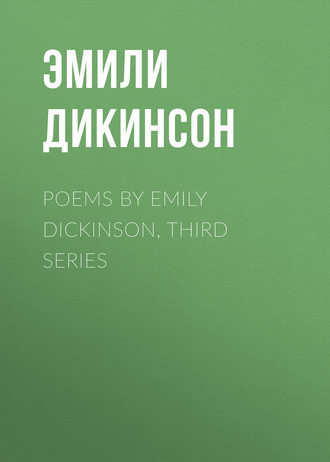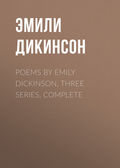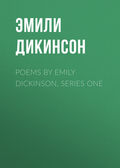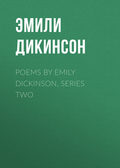полная версия

Эмили Дикинсон
Poems by Emily Dickinson, Third Series
X.
IMMORTALITY
It is an honorable thought,
And makes one lift one's hat,
As one encountered gentlefolk
Upon a daily street,
That we've immortal place,
Though pyramids decay,
And kingdoms, like the orchard,
Flit russetly away.
XI
The distance that the dead have gone
Does not at first appear;
Their coming back seems possible
For many an ardent year.
And then, that we have followed them
We more than half suspect,
So intimate have we become
With their dear retrospect.
XII
How dare the robins sing,
When men and women hear
Who since they went to their account
Have settled with the year! —
Paid all that life had earned
In one consummate bill,
And now, what life or death can do
Is immaterial.
Insulting is the sun
To him whose mortal light,
Beguiled of immortality,
Bequeaths him to the night.
In deference to him
Extinct be every hum,
Whose garden wrestles with the dew,
At daybreak overcome!
XIII.
DEATH
Death is like the insect
Menacing the tree,
Competent to kill it,
But decoyed may be.
Bait it with the balsam,
Seek it with the knife,
Baffle, if it cost you
Everything in life.
Then, if it have burrowed
Out of reach of skill,
Ring the tree and leave it, —
'T is the vermin's will.
XIV.
UNWARNED
'T is sunrise, little maid, hast thou
No station in the day?
'T was not thy wont to hinder so, —
Retrieve thine industry.
'T is noon, my little maid, alas!
And art thou sleeping yet?
The lily waiting to be wed,
The bee, dost thou forget?
My little maid, 't is night; alas,
That night should be to thee
Instead of morning! Hadst thou broached
Thy little plan to me,
Dissuade thee if I could not, sweet,
I might have aided thee.
XV
Each that we lose takes part of us;
A crescent still abides,
Which like the moon, some turbid night,
Is summoned by the tides.
XVI
Not any higher stands the grave
For heroes than for men;
Not any nearer for the child
Than numb three-score and ten.
This latest leisure equal lulls
The beggar and his queen;
Propitiate this democrat
By summer's gracious mien.
XVII.
ASLEEP
As far from pity as complaint,
As cool to speech as stone,
As numb to revelation
As if my trade were bone.
As far from time as history,
As near yourself to-day
As children to the rainbow's scarf,
Or sunset's yellow play
To eyelids in the sepulchre.
How still the dancer lies,
While color's revelations break,
And blaze the butterflies!
XVIII.
THE SPIRIT
'T is whiter than an Indian pipe,
'T is dimmer than a lace;
No stature has it, like a fog,
When you approach the place.
Not any voice denotes it here,
Or intimates it there;
A spirit, how doth it accost?
What customs hath the air?
This limitless hyperbole
Each one of us shall be;
'T is drama, if (hypothesis)
It be not tragedy!
XIX.
THE MONUMENT
She laid her docile crescent down,
And this mechanic stone
Still states, to dates that have forgot,
The news that she is gone.
So constant to its stolid trust,
The shaft that never knew,
It shames the constancy that fled
Before its emblem flew.
XX
Bless God, he went as soldiers,
His musket on his breast;
Grant, God, he charge the bravest
Of all the martial blest.
Please God, might I behold him
In epauletted white,
I should not fear the foe then,
I should not fear the fight.
XXI
Immortal is an ample word
When what we need is by,
But when it leaves us for a time,
'T is a necessity.
Of heaven above the firmest proof
We fundamental know,
Except for its marauding hand,
It had been heaven below.
XXII
Where every bird is bold to go,
And bees abashless play,
The foreigner before he knocks
Must thrust the tears away.
XXIII
The grave my little cottage is,
Where, keeping house for thee,
I make my parlor orderly,
And lay the marble tea,
For two divided, briefly,
A cycle, it may be,
Till everlasting life unite
In strong society.
XXIV
This was in the white of the year,
That was in the green,
Drifts were as difficult then to think
As daisies now to be seen.
Looking back is best that is left,
Or if it be before,
Retrospection is prospect's half,
Sometimes almost more.
XXV
Sweet hours have perished here;
This is a mighty room;
Within its precincts hopes have played, —
Now shadows in the tomb.
XXVI
Me! Come! My dazzled face
In such a shining place!
Me! Hear! My foreign ear
The sounds of welcome near!
The saints shall meet
Our bashful feet.
My holiday shall be
That they remember me;
My paradise, the fame
That they pronounce my name.
XXVII.
INVISIBLE
From us she wandered now a year,
Her tarrying unknown;
If wilderness prevent her feet,
Or that ethereal zone
No eye hath seen and lived,
We ignorant must be.
We only know what time of year
We took the mystery.
XXVIII
I wish I knew that woman's name,
So, when she comes this way,
To hold my life, and hold my ears,
For fear I hear her say
She's 'sorry I am dead,' again,
Just when the grave and I
Have sobbed ourselves almost to sleep, —
Our only lullaby.
XXIX.
TRYING TO FORGET
Bereaved of all, I went abroad,
No less bereaved to be
Upon a new peninsula, —
The grave preceded me,
Obtained my lodgings ere myself,
And when I sought my bed,
The grave it was, reposed upon
The pillow for my head.
I waked, to find it first awake,
I rose, – it followed me;
I tried to drop it in the crowd,
To lose it in the sea,
In cups of artificial drowse
To sleep its shape away, —
The grave was finished, but the spade
Remained in memory.
XXX
I felt a funeral in my brain,
And mourners, to and fro,
Kept treading, treading, till it seemed
That sense was breaking through.
And when they all were seated,
A service like a drum
Kept beating, beating, till I thought
My mind was going numb.
And then I heard them lift a box,
And creak across my soul
With those same boots of lead, again.
Then space began to toll
As all the heavens were a bell,
And Being but an ear,
And I and silence some strange race,
Wrecked, solitary, here.
XXXI
I meant to find her when I came;
Death had the same design;
But the success was his, it seems,
And the discomfit mine.
I meant to tell her how I longed
For just this single time;
But Death had told her so the first,
And she had hearkened him.
To wander now is my abode;
To rest, – to rest would be
A privilege of hurricane
To memory and me.
XXXII.
WAITING
I sing to use the waiting,
My bonnet but to tie,
And shut the door unto my house;
No more to do have I,
Till, his best step approaching,
We journey to the day,
And tell each other how we sang
To keep the dark away.
XXXIII
A sickness of this world it most occasions
When best men die;
A wishfulness their far condition
To occupy.
A chief indifference, as foreign
A world must be
Themselves forsake contented,
For Deity.
XXXIV
Superfluous were the sun
When excellence is dead;
He were superfluous every day,
For every day is said
That syllable whose faith
Just saves it from despair,
And whose 'I'll meet you' hesitates
If love inquire, 'Where?'
Upon his dateless fame
Our periods may lie,
As stars that drop anonymous
From an abundant sky.
XXXV
So proud she was to die
It made us all ashamed
That what we cherished, so unknown
To her desire seemed.
So satisfied to go
Where none of us should be,
Immediately, that anguish stooped
Almost to jealousy.





